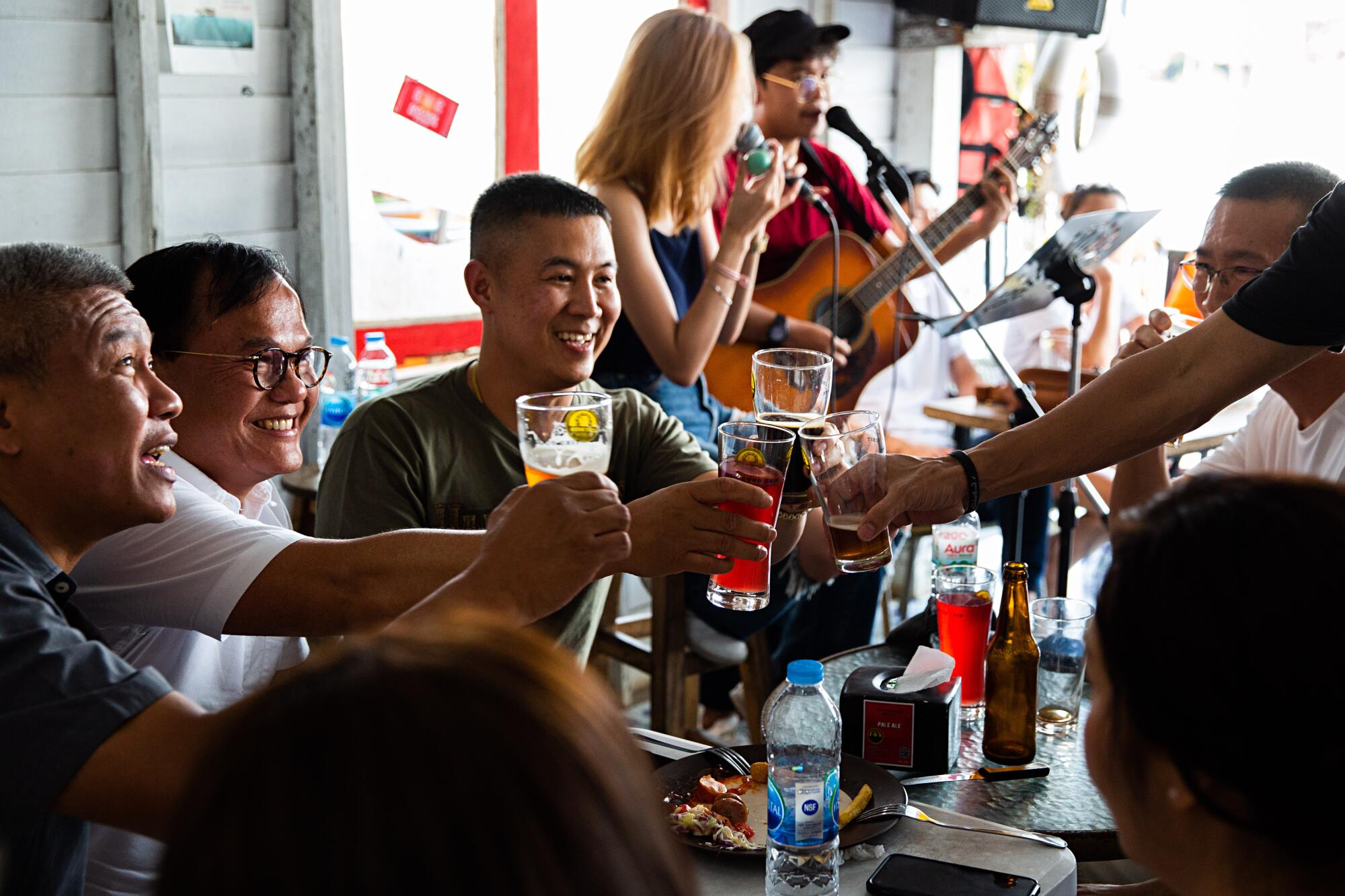
- Share via
KOH KRET, Thailand — He hardly seems like an outlaw — a 48-year-old army colonel who holds a doctorate in computer engineering and teaches at Thailand’s most prestigious military academy.
On a rustic island of palm trees and moldering temples upriver from Bangkok, Wichit Saiklao owns a weekend brewhouse where Thais flock to sample his latest selection of specialty beers — and learn how to make their own.
With empty bottles lining the walls, a bitcoin machine in a corner and a pop soundtrack playing overhead, the pleasantly ramshackle bar seems like just another outpost of the global craft beer craze. But in Thailand, selling homemade brews is banned under a decades-old law that protects two giant family-owned corporations, which control 90% of the country’s $5.7-billion beer market.
Small-time brewers face fines, potential jail time and the constant risk of raids by police and tax inspectors. To many Thais, the rules are the product of a political system that has grown more authoritarian since a 2014 military coup, squashing innovators while indulging the wealthy and well-connected.
Chit, as he’s known, believes some laws are not worth following — even for an army man in a country ruled by former generals.
So he pays the fines and endures the searches but carries on, serving up a quiet revolution with every pint. More than 3,000 home brewers have cycled through the Chit Beer academy, building a movement that has begun to challenge the alcohol law — and, he hopes, the strictures of Thai society.
“I don’t care if you make craft beer a business, or even if you make good beer, but I want you to feel the experience of releasing your potential,” Chit said. “For me, beer is just a way to change the country.”
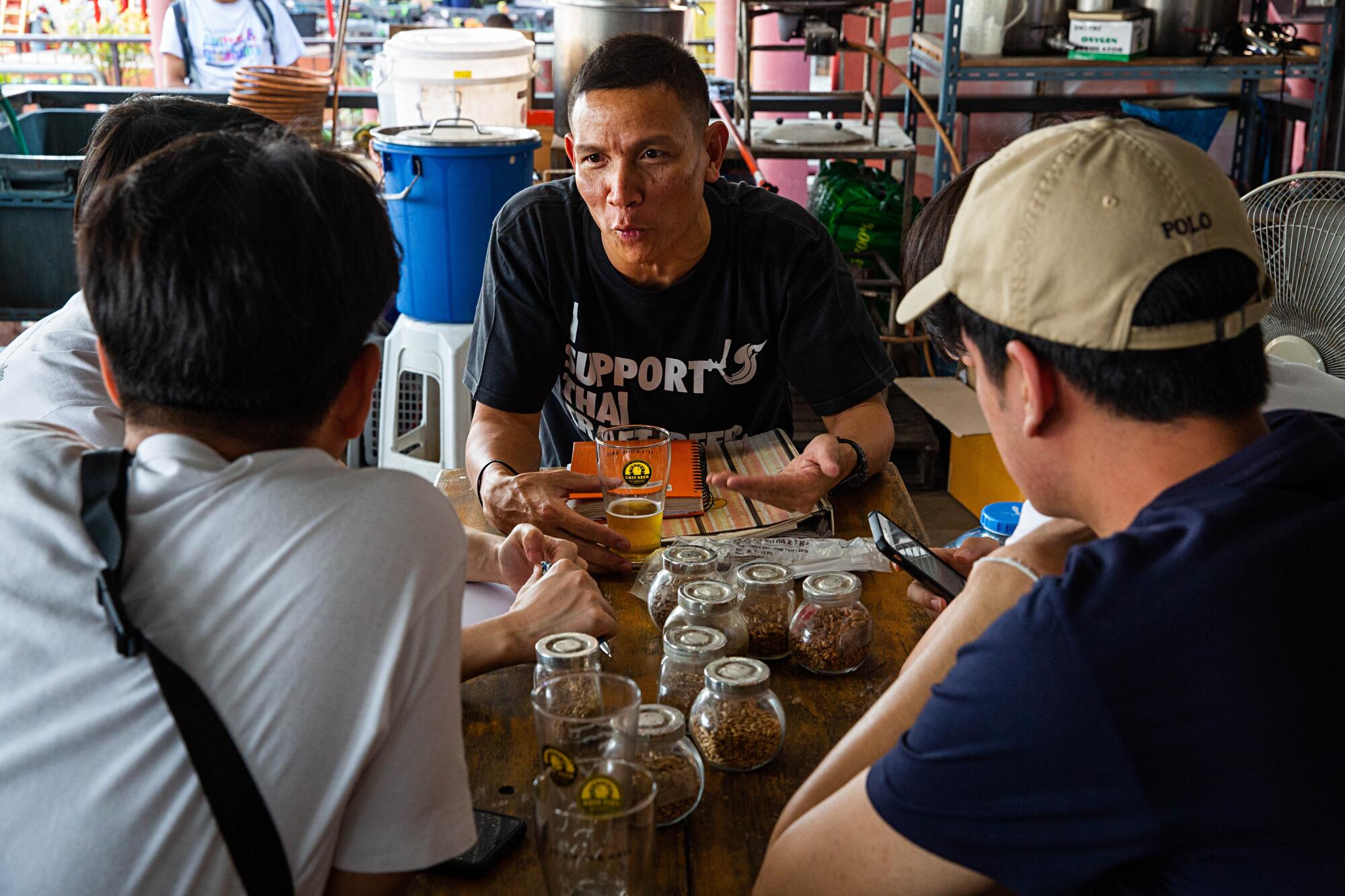
On a warm Saturday afternoon weeks before the kingdom locked down against the coronavirus, buoyant young Thais in canvas sneakers and flush-cheeked foreigners sweating under straw hats bellied up to wooden tables on Chit’s veranda on Koh Kret, an hour and a half from central Bangkok by train and ferry.
Frank Sinatra’s “My Way” played on the speakers. Chit’s younger brother Porn worked the taps, pouring fruity, straw-hued Amata Weizens and golden Mosaic Hop Drop Saisons — among eight beers on offer that weekend — into glasses featuring a turtle logo and the motto, “It’s Good Chit.”
The terrapin is a reminder to slow down, Chit said — to leave the frenzy of Bangkok behind and drink in the measured, earthy process of beer-making. Under a hand-painted “Brewing Academy” sign, grains steeped in a drum of water as Chit talked three pupils in their late 20s through the finer points of malt and yeast, amber and ale.
“If you can make one kind of beer, you can make them all,” he told them. “The point is to figure out what you like, and to know that you have choices. The power is yours.”
The two young men in the class nodded. The lone woman took notes.
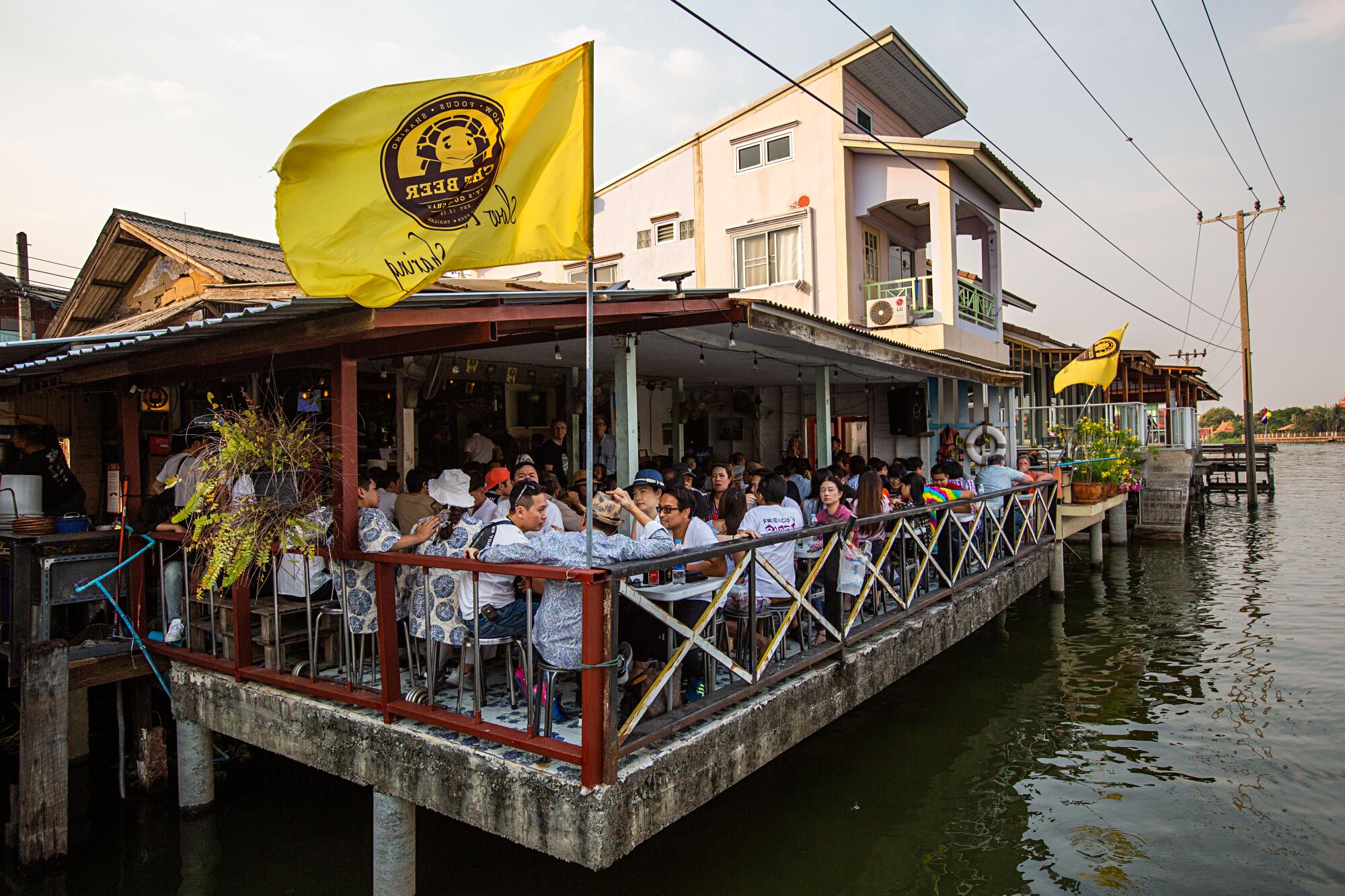
Since the army entered politics, dissent in Thailand has been harshly punished. But the alcohol law remains irregularly enforced. Chit has been fined eight times, paying anywhere from a few hundred dollars to $1,500.
Still, he finds no contradiction between his renegade hobby and his job teaching engineering at Chulachomklao Royal Military Academy, the training ground for a century’s worth of army chiefs and politicians — including the sitting prime minister, Prayuth Chan-ocha.
“I’m not going to compete with any of them for any position,” he said. “I’m not going to threaten their career path. So nobody in the army cares about what I do.”
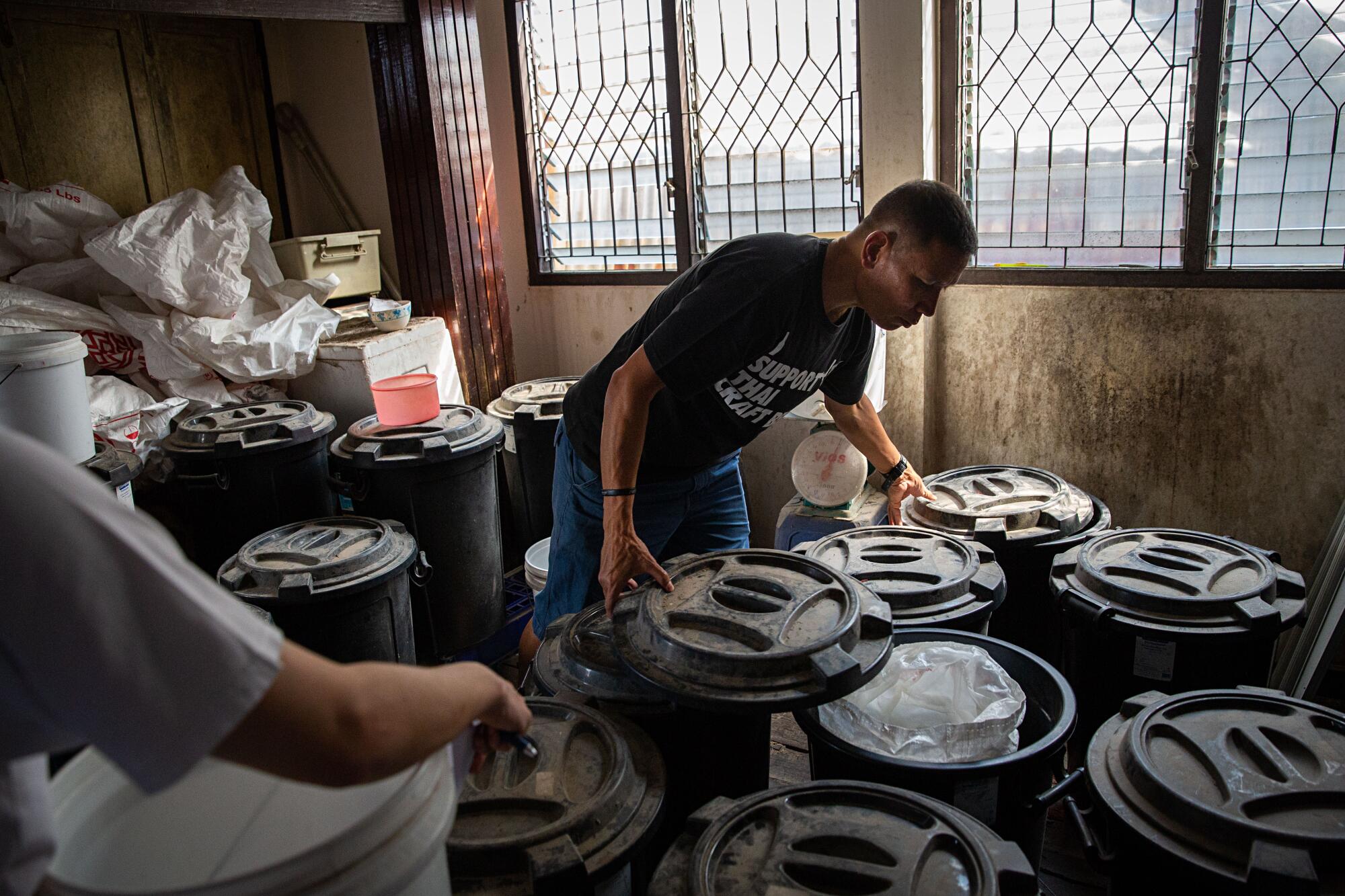
Seventeen years after ending his service as a soldier, Chit, who retains his officer’s rank, still has the close-cropped hair, trim build and raw vigor of a young recruit. His hunger grew out of a poor, lonesome childhood in Phatthalung, a southern province of rice and rubber farms.
The oldest of three children, Chit often watched his father come home drunk and scream at his mother. He would hide in another room when they fought, reading books through his tears.
“I felt so unlucky,” he said. “I always thought: Why did my parents get married? Why did they have me? I turned that into the energy to change.”
The pudgy teen excelled at school, earning admission to a military academy in Bangkok. Endless pushups slimmed him down. Still, he chafed at the discipline and yearned to go abroad, believing it was the only way to deliver his family from poverty. Many nights after lights out, he sneaked off to the bathroom with his backpack, burying himself in books until morning.
He got a chance to go to the U.S. with a scholarship to the Virginia Military Institute. From there it was on to Georgia Tech in Atlanta, where on a Saturday night in 1996, an American buddy gave the sober young cadet his first taste of home-brewed beer.
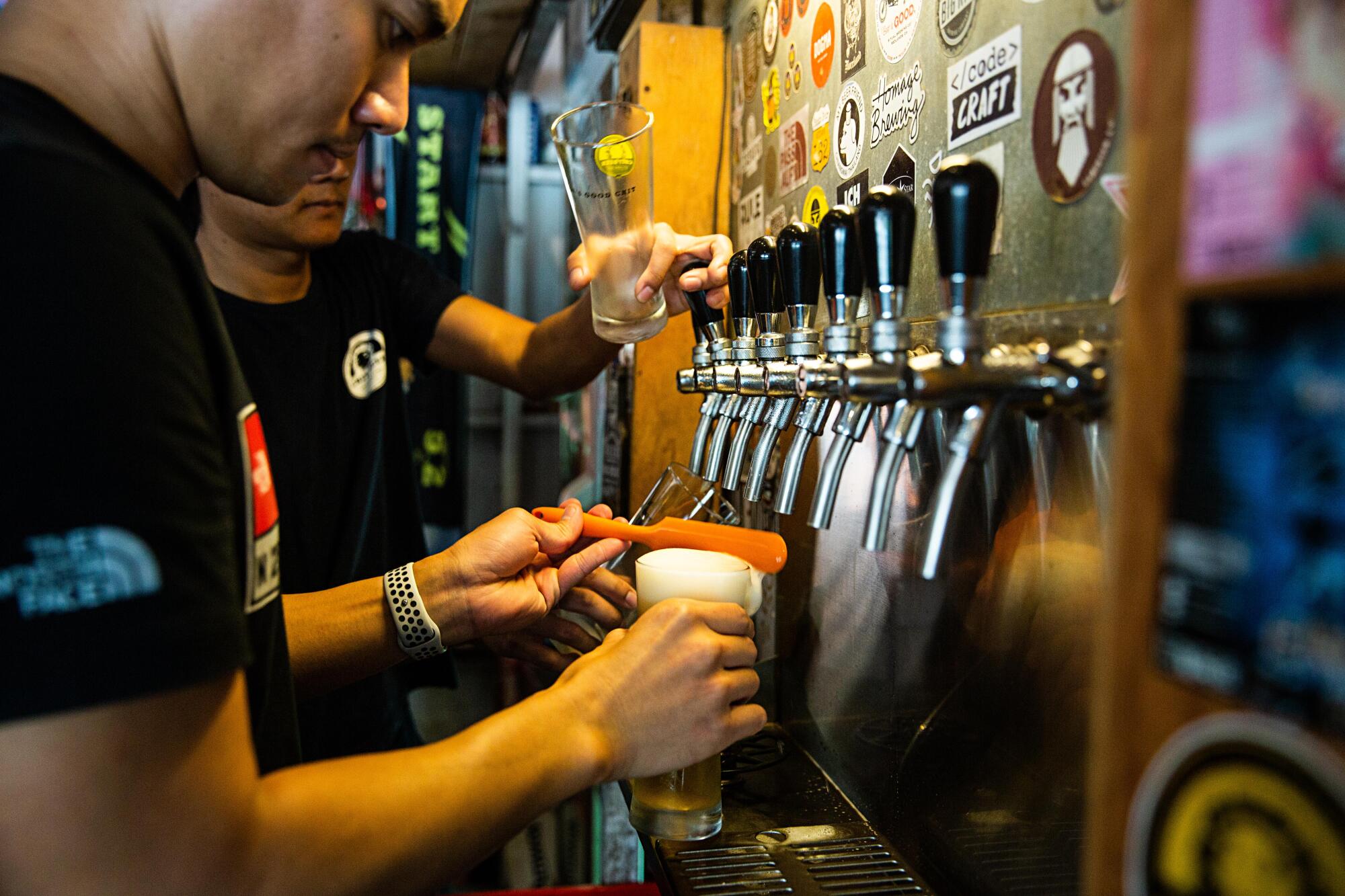
Chit used an expletive to describe the taste. “But what impressed me was the idea that you could make this at home. I wanted to brew beer too, but mainly so I wouldn’t feel lonely. I thought, if I had beer, friends would come over.”
Juggling side jobs as a computer programmer and a bartender at Buffalo Wild Wings — whose recipe he adapted for the spicy chicken wings served at the brew house — Chit completed his PhD in 2003 and flew home to Thailand. He spent the 30-hour journey scribbling a manifesto for his future.
“When I was in the U.S. I looked at my country like, ‘Why? Why?’” he said. “I came back at 31 and I felt like I was starting my life.”
He launched a successful logistics startup, built his parents a house, put his brother and sister through college — then turned back to beer.
It was 2012, and artisanal beer didn’t exist in Thailand. Customs officers probably didn’t know what they were looking at when a home-brewing kit addressed to Chit arrived from the U.S. via Amazon.
His first batches turned out treacly and flat. It wasn’t until the third try that he realized that the little white packets he was discarding weren’t desiccants but yeast, which catalyzes fermentation and gives beer its alcohol content and bubbles.
Soon he was hosting nighttime tastings at his house on Koh Kret and gaining a following on Facebook. After launching the weekly classes in 2014, he helped former students set up a brewery in Cambodia and ship the beer back to Thailand. Soon Thai beers were being made in Vietnam, Taiwan and Australia.
The new varieties cost a premium because of heavy import taxes. But trendy young Thais thrilled to the fresh flavors of chocolaty stouts and pale ales infused with local ingredients: berries, lemongrass, kaffir lime leaves, a type of ginger called galangal.
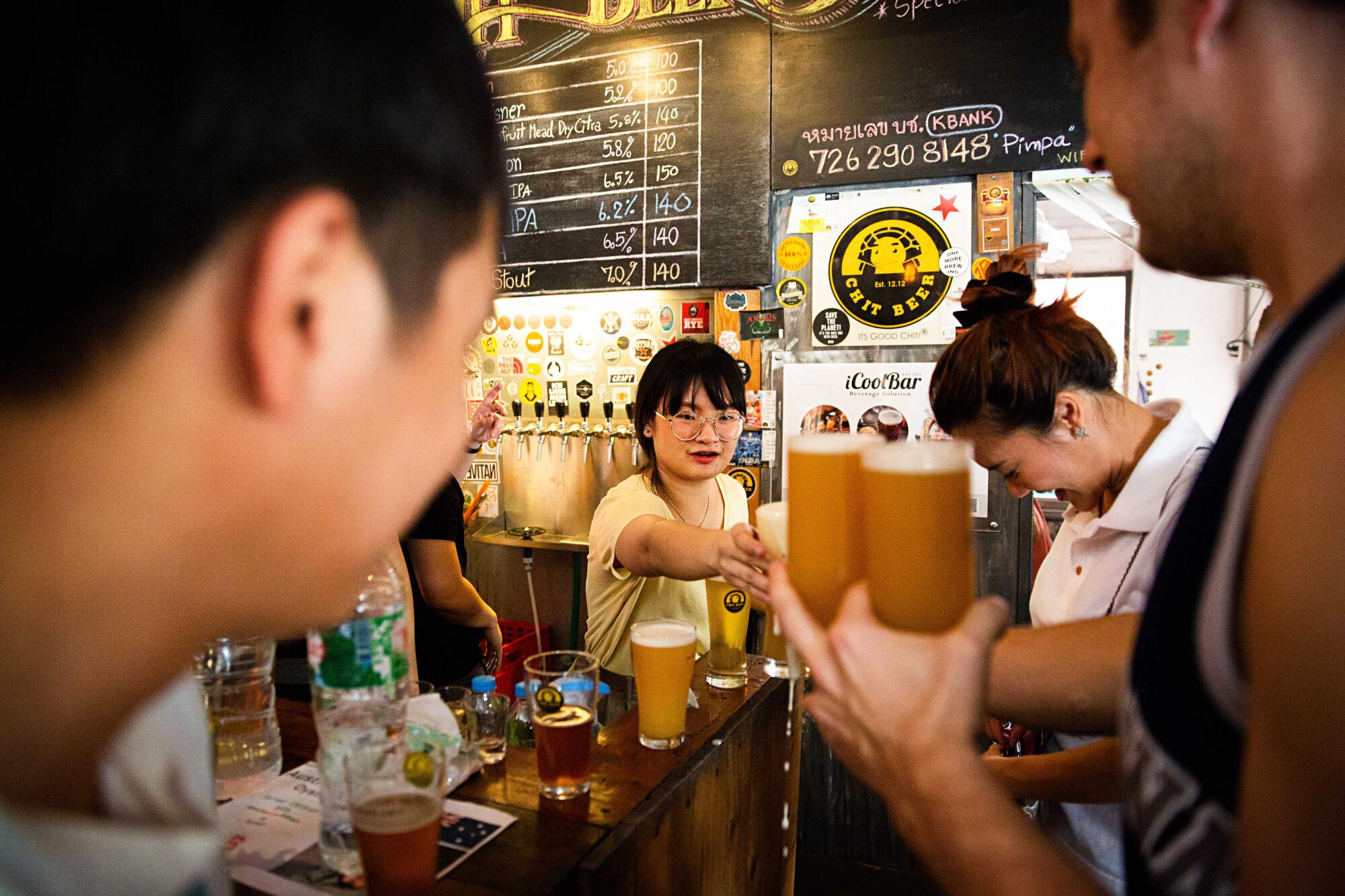
In Bangkok’s craft beer scene, Chit came to be known as “the godfather.”
“He’s really nice and generous — and a visionary,” said Taopiphop Limjittrakorn, a 31-year-old home brewer who goes by Tao.
Lanky and affable, with a slacker vibe that belies his law school education, Tao became enchanted with craft beer after tasting a refreshingly bitter India pale ale on a visit to New York. Back in Bangkok, he ditched his corporate job and set up an illicit brewery in a rented building, importing malt and hops from the U.S. and Europe.
In early 2017, police arrived and demanded a hefty bribe. Tao didn’t have the money, so he spent the night in jail and paid a $150 fine.
But then he went on TV to denounce the alcohol laws and became a sensation. Thailand was beginning to prepare for 2019 parliamentary elections, the first since the coup. A progressive new party called Future Forward was casting around for young candidates, and Tao’s name came up.
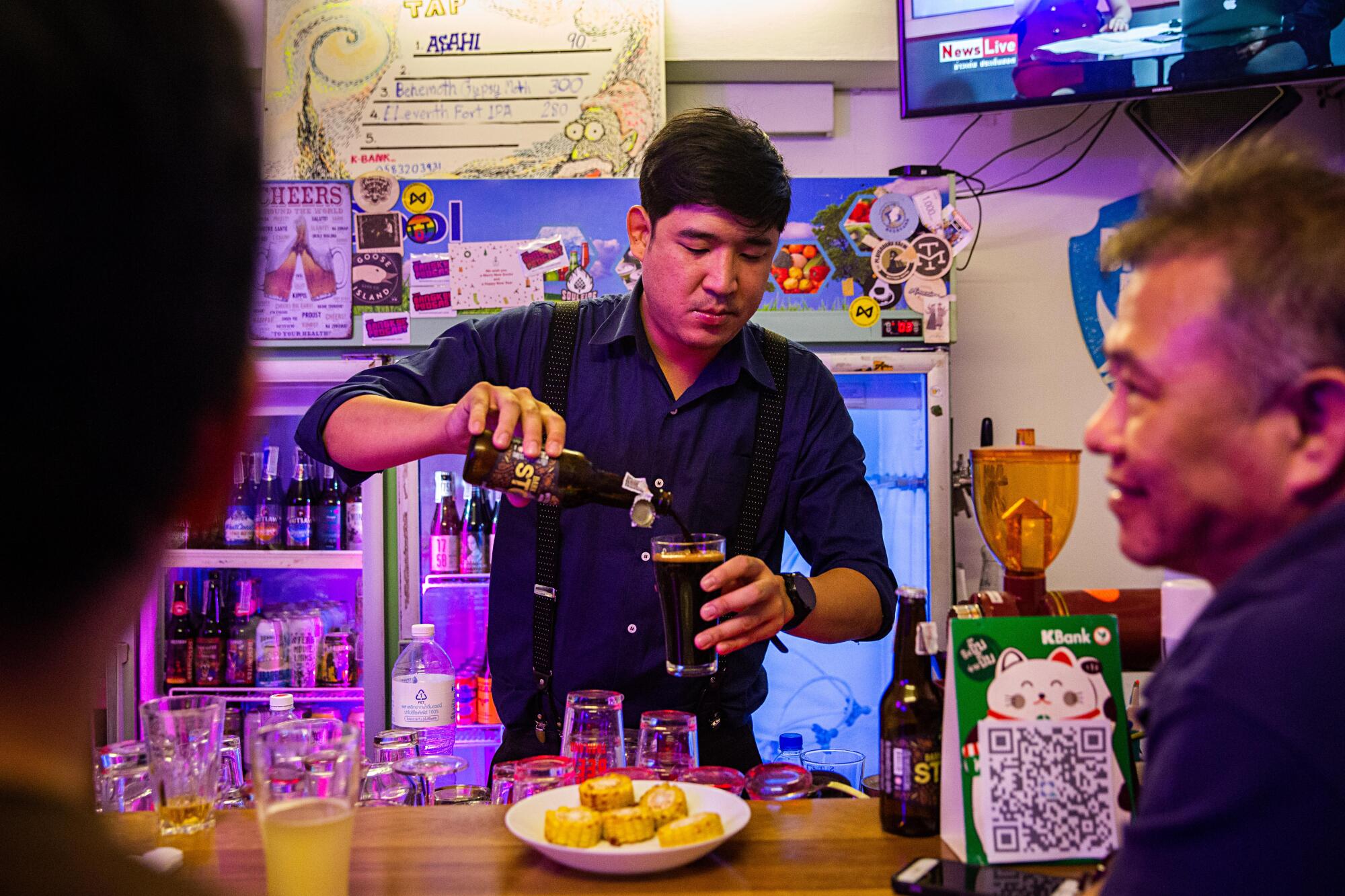
A pro-military party won the heavily skewed election, but Future Forward finished a surprising third with 80 seats — including Tao’s. He became the second youngest member of the legislature, turning the ground floor of his new pub, the Taopiphop Bar Project, into his parliamentary office.
On a warm night in January, Tao sat behind a microphone, beer in hand, at a small bar above a Bangkok bookshop. He had invited some of Thailand’s roughly 70 craft beer makers to discuss his party’s proposal: to eliminate the minimum requirements for brewers and distillers, allowing them to manufacture beer and spirits domestically.
Licenses are currently granted to brewpubs only if they produce at least 100,000 liters a year — the equivalent of 800 single-serving bottles a day — and have more than $300,000 invested. Industrial bottlers must churn out 100 times that amount, which leaves the two conglomerates that make Chang, Singha and Leo, pale lagers that are as unremarkable as they are ubiquitous.
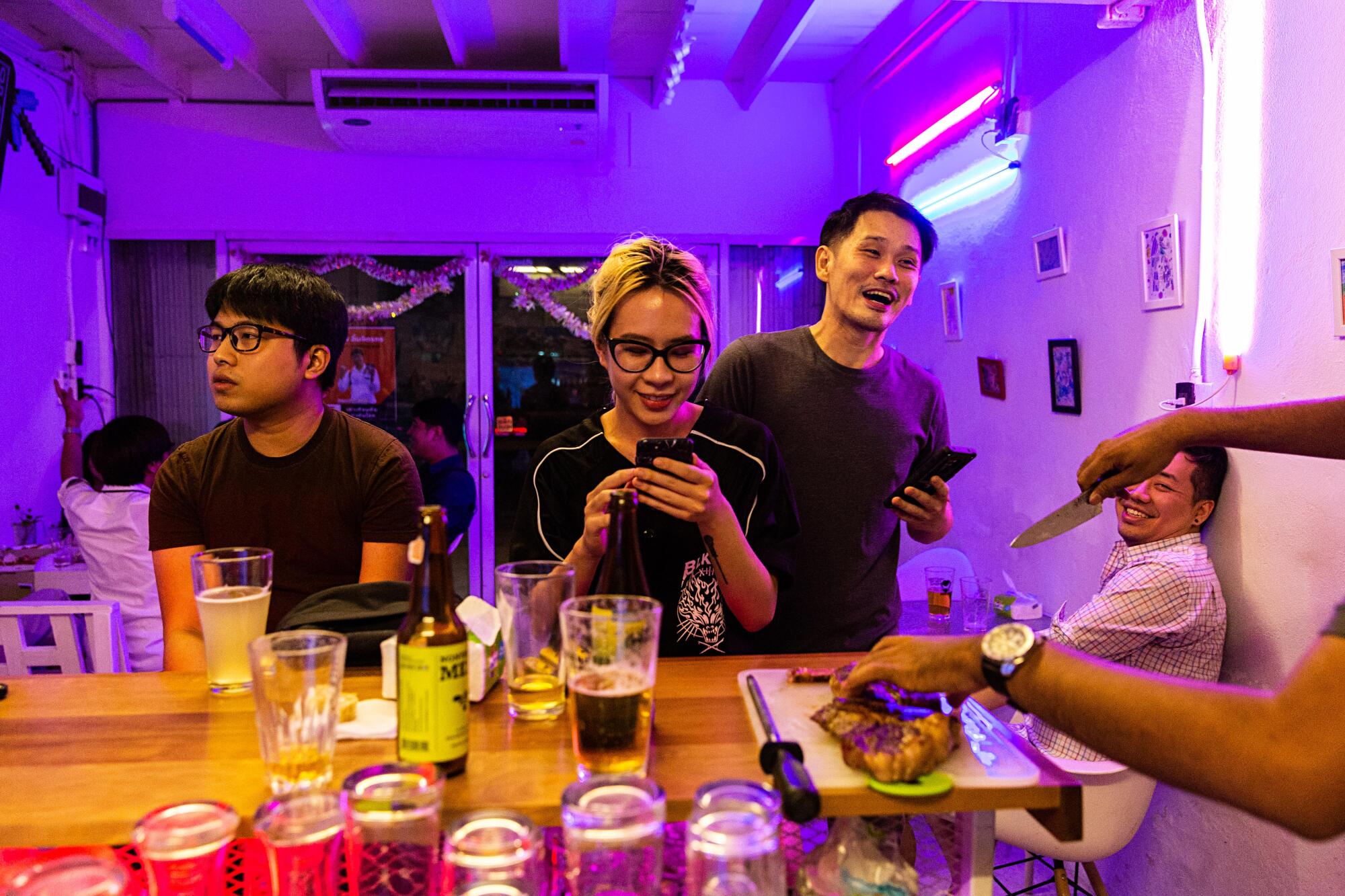
“People want to see small businesses fight against big corporations,” Tao told the brewers. “They really want us to be the symbol of change in this country.”
Moments later, the door creaked and in walked Chit. Brewers put down their beers, some joining their palms in respect.
When Chit spoke, he was measured: “We need to unlock home brewing so that people have peace of mind when they make beer. But as far as a commercial business, I don’t know how far we can go.”

Afterward, sipping a pale ale at a picnic table outside his taproom Turtle Bar, he marveled that the movement he’d launched alone and in secret could be on the cusp of a breakthrough. But he predicted Tao’s upstart party would provoke a backlash from the military.
Weeks later, a court dissolved Future Forward over a campaign finance violation. Tao and other members, regrouped under a new party, have vowed to press ahead with the liquor bill.
Back on Koh Kret, Chit steers clear of politics. His classes usually have a two-month wait list, but patience, as a brewmeister will tell you, is part of the process. Students must return to the island 14 days after the lesson, when their batches are ready to be bottled.
In Chit’s view, the wait teaches them to value the future — a catalyst, like yeast, for political awakening.
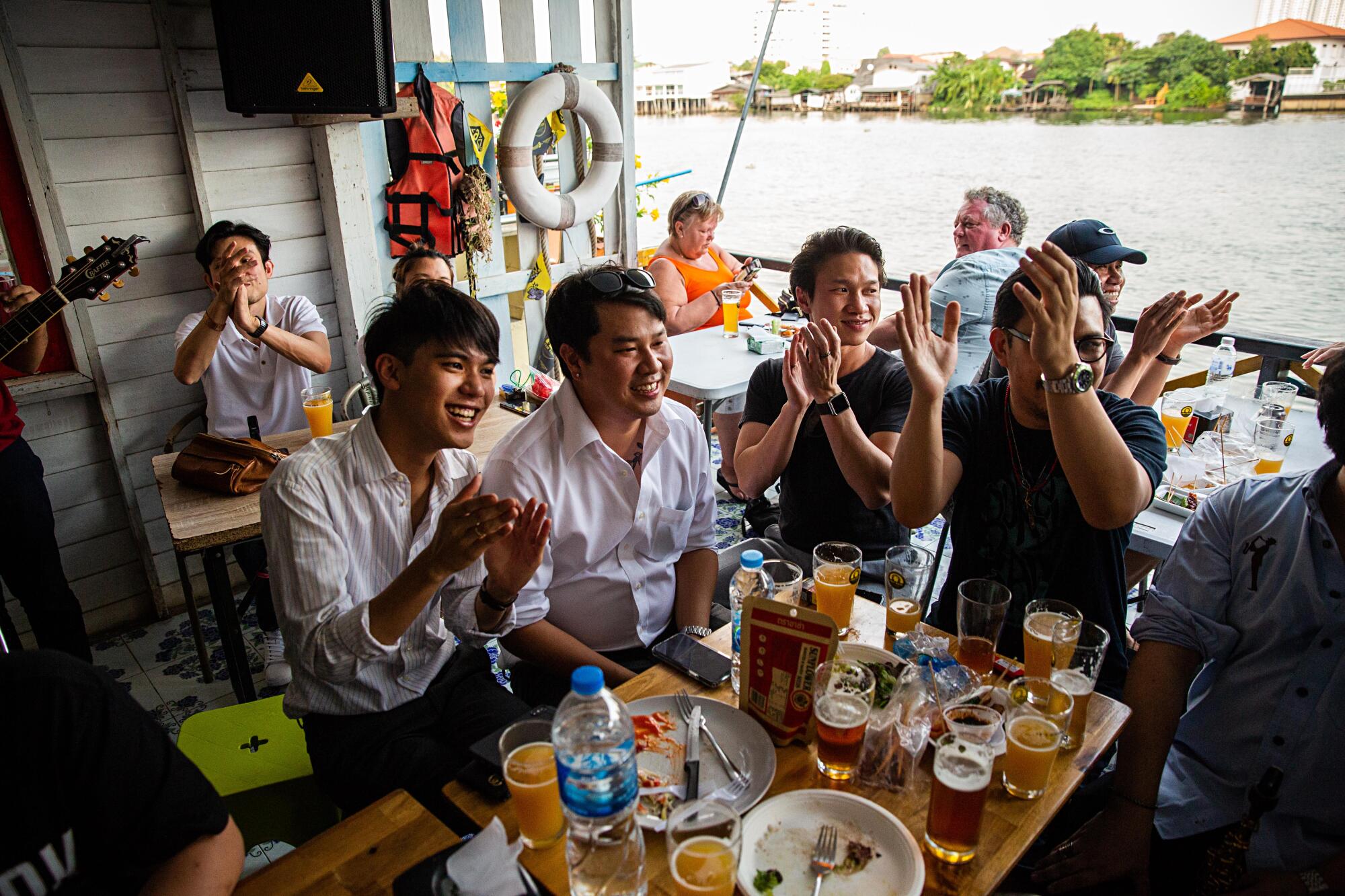
Special correspondent Poypiti Amatatham contributed to this report.
More to Read
Sign up for Essential California
The most important California stories and recommendations in your inbox every morning.
You may occasionally receive promotional content from the Los Angeles Times.









